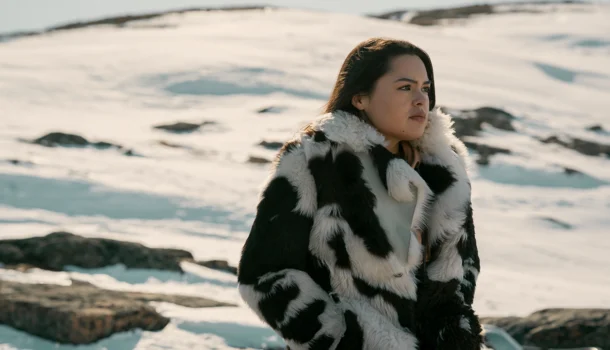Amid the glacial silence of a land that always seems on the edge of forgetting, there lies a narrative that chooses tenderness as its form of resistance. “North of North” unfolds in the territory of Nunavut, where the white landscape is not merely a backdrop, but accumulated memory and ancestral scar. What could easily slip into the fetish of the exotic, however, rejects such simplification. The series anchors itself in Ice Cove — not about it, but within it — with an internal gaze, free from the concessions of exportable folklore. In this setting of cutting winds and deep-rooted bonds, Siaja returns to her mother’s house carrying more than just luggage: she brings an unresolved past, the weight of motherhood, and the fracture of a marriage marked by erasure. Her reunion with Neevee, a figure steeped in contradictions and haunted by poorly digested choices, ignites the emotional core of the narrative, where conflicts don’t ask for resolution, but for presence.
There are echoes of sitcoms and hints of romantic comedy, yet nothing about this is superficial. The human geography of Ice Cove is built from particularities that overflow with authenticity: improvised festivals that defy the cold, disputes over cultural initiatives, and sports matches where walrus bones replace bats. This isn’t local color for its own sake — each detail pulses as an extension of a collective identity under constant reconstruction. The costumes, meticulously crafted by Inuit hands, clothe not just bodies but stories. Languages intertwine — Inuktitut, English, local slang — creating their own cadence, a linguistic choreography that escapes the standardization of global entertainment. Spirituality, far from being an exotic ornament, weaves into the narrative with the density of a living symbolic system, as if the appearance of Nuliajuk, the sea goddess, were less a supernatural event and more a legitimate way of seeing.
Siaja, portrayed with pinpoint nuance by Anna Lambe, is not a protagonist who claims heroism. She refuses categorization: neither victim nor redeemer. Her journey is one of someone trying to forge a new vocabulary for inherited pain, without denying the roles she inhabits. Her clash with Helen — a white manager full of intrusive enthusiasm and automated empathy — is not just about a job, but about clashing discourses. The supposed efficiency of colonial models meets the subtle resistance of someone who refuses to be patronized. Siaja’s appointment to an administrative post, while comically tinged, becomes a crack through which the possibility of redefinition seeps. Through romantic fumbles, family revelations, and unfinished conversations, she slowly builds a path to autonomy that doesn’t need to shout to be radical.
Humor here is not an escape from pain, but a counterweight to its rawness. Bureaucratic absurdities coexist with moments of lyricism. Silences carry more weight than accusations. And in this ambiguous space — between the absence of explicit reconciliations and the persistence of everyday gestures — the series finds its power. The relationship between Siaja and Neevee is never fully spelled out — but reveals itself through unspoken complicities, in small acts that might appear trivial at first glance. The community likewise resists neat typologies: each character, from the public servant to the village elder, holds a fragment of humanity that defies categorization. The narrative unfolds not as a chain of events, but as a sedimentation of bonds.
The beauty of “North of North” lies precisely in its rejection of didacticism. There are no cultural manuals or intermediaries to explain what one should feel. The viewer must trust what they do not immediately understand, for it is within that strangeness that the series breathes. Structural precariousness — fragile roofs, porous walls, logistical isolation — is not painted as decline, but as fertile ground for improvisation, for the creativity of everyday reinvention. The cold is not a threat: it’s a frame. And within it, the quiet combustion of affection transforms the narrative into something that warms without fanfare. What endures, in the end, is the sense that intimacy, too, can be a form of revolution — and that even at the northernmost edge, there is still warmth enough to grow a new beginning.
Series: North of North
Creator: Stacey Aglok MacDonald and Alethea Arnaquq-Baril
Year: 2025
Genres: Comedy
Rating: 8/10

